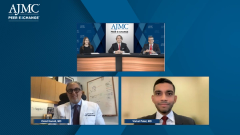
Dermatologists and Immunotherapy: Managing Patient Expectations
Dr Pisano shares insights on expanding dermatologists' comfort with immunotherapy through collaborative learning and collective expertise.
Episodes in this series

This is a video synopsis/summary of a Peer Exchange involving Jason Luke, MD, FACP; Christopher Barker, MD; Omid Hamid, MD; Vishal Patel, MD; and Catherine Pisano, MD.
Pisano stated dermatologists are very aware of immunotherapy efficacy in advanced cutaneous squamous cell carcinoma (cSCC) and basal cell carcinoma (BCC) from prominent journal coverage. However, solo dermatology practitioners may hesitate to directly administer immunotherapy. She emphasized that dermatologists play key roles in setting patient expectations around neoadjuvant/palliative intent, managing cutaneous adverse effects to enable treatment continuation, and identifying severe reactions necessitating discontinuation. Hamid discussed how immunotherapy toxicities present a “black box” for subspecialists inexperienced with these agents. While serious adverse events are uncommon, serious endocrine, gastrointestinal, and cardiac immune-related adverse events can still occur and may appear long after treatment cessation. He stressed the importance of educating the care team on immune-mediated adverse effects at treatment initiation and through the course of therapy, as unfamiliarity causes heightened anxiety around managing symptoms relative to clinicians well-versed in immunotherapy. Hamid concluded by saying that cross-disciplinary meetings focused on adverse event profiles, timing, and management can build expertise.
Video synopsis is AI-generated and reviewed by AJMC® editorial staff.
Newsletter
Stay ahead of policy, cost, and value—subscribe to AJMC for expert insights at the intersection of clinical care and health economics.










